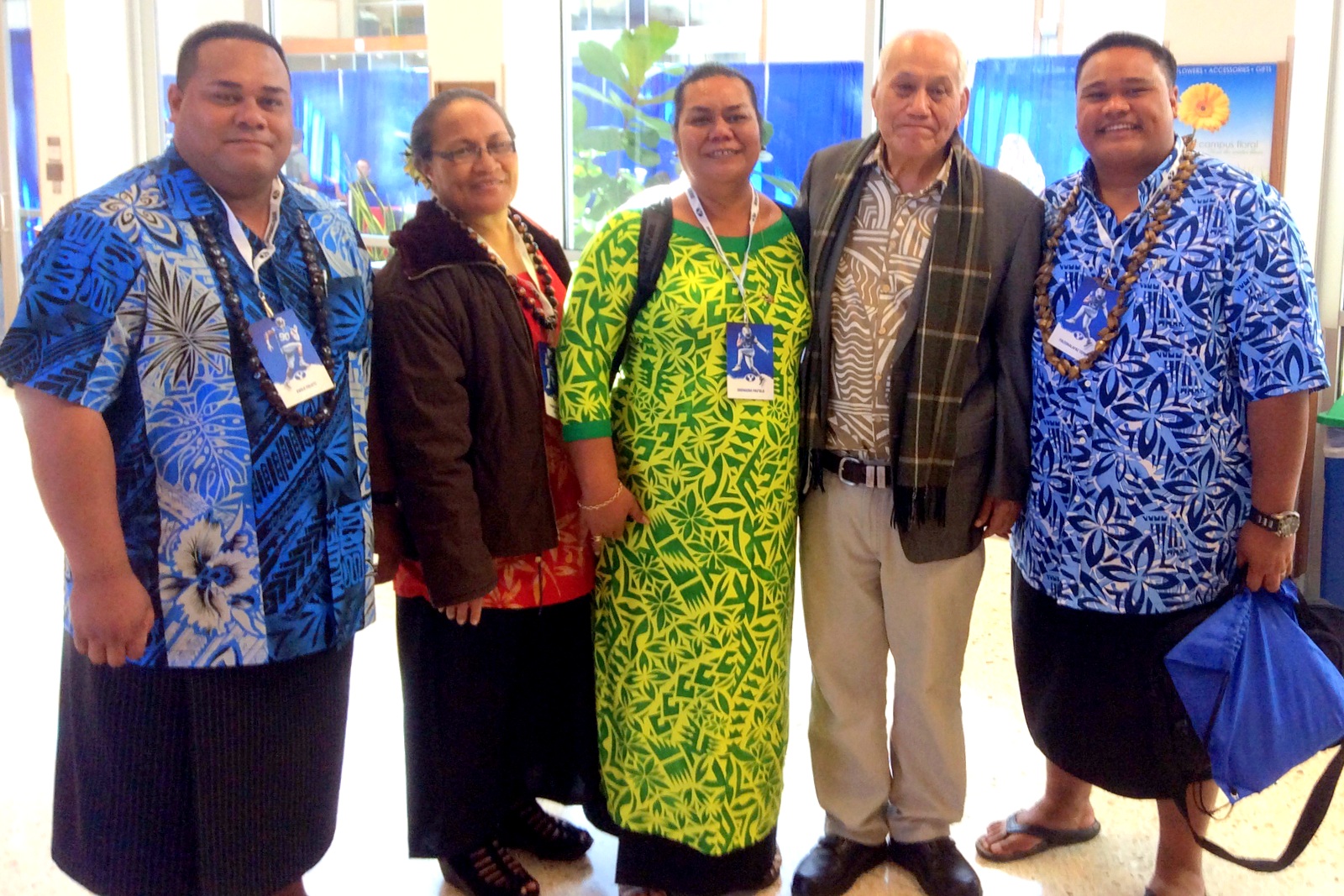
His Highness Tui Atua Tupua Tamasese Taisi Tufuga Tupuola Efi 2nd right, former Prime Minister and Head of State of Samoa, confers with faculty from the American Samoa Community College Samoan Studies Institute during the 2018 International Samoan Language Symposium held in Provo, Utah in late September. Attending the Symposium were, from left to right, Evile Feleti, Tamari Mulitalo-Cheung, SSI Director Okenaisa Fauolo-Manila, His Highness Tamasese, and Maselui Faleosalafai Tipa. Courtesy Photo

His Highness Tui Atua Tupua Tamasese Taisi Tufuga Tupuola Efi 2nd right, former Prime Minister and Head of State of Samoa, confers with faculty from the American Samoa Community College Samoan Studies Institute during the 2018 International Samoan Language Symposium held in Provo, Utah in late September. Attending the Symposium were, from left to right, Evile Feleti, Tamari Mulitalo-Cheung, SSI Director Okenaisa Fauolo-Manila, His Highness Tamasese, and Maselui Faleosalafai Tipa. Courtesy Photo
ASCC-SSI Attends Samoan Language Symposium in Utah
October 16, 2018
By James Kneubuhl, ASCC Press Officer
Faculty from the Samoan Studies Institute (SSI) at the American Samoa Community College (ASCC) joined distinguished guests from across the United States and the Pacific region at the 2018 International Samoan Language Symposium held in late September at Brigham Young University in Provo, Utah. Attending the symposium, only the third of its kind since Samoan language study came into prominence, were SSI Director Okenaisa Fauolo-Manila; Evile Feleti, Samoan Studies Department Chair; Tamari Mulitalo Cheung, Language Translator; and Maseuli Faleosalafai Tipa, Researcher.
The symposium followed the theme “E pala le ma’a, ae le pala le upu ma le tala (Even stones erode, but words and stories never fade away),” and highlighted the unique worldview, universal cultural values, and poetical qualities of the Samoan language. The ASCC group collaborated to give a multi-part presentation “Addressing Challenges & Barriers to Promoting Gagana Samoa,” in which they relayed to their off-island contemporaries their experience of promoting traditional language and culture in the multi-lingual and rapidly evolving social environment of American Samoa. “We shared a timeline on the history of SSI as a handout,” said Fauolo-Manila. “We also shared publications from SSI. Then each one of us shared personal stories highlighting what we are currently doing at the institute.”
Among the many respected figures in Samoan language scholarship present at the symposium, the most widely-recognized were His Highness Tui Atua Tupua Tamasese Taʻisi Tufuga Tupuola Efi, former Prime Minister and Head of State of Samoa, and Professor Galumalemana Hunkin, renowned author of the Gagana Samoa textbook. Fauolo-Manila found inspiration in both speakers. “Afioga Tui Atua Tupua Tamasese delivered a powerful paper on the depth of language found in “solo o le va” (Samoans story of creation, Manua version),” she said, “and Professor Hunkin gave a heartfelt presentation on the challenge Samoans in New Zealand went through to have their language taught from childhood to university-level.”
From the many presentations by Samoan language scholars from a diversity of locations, the team from ASCC noticed a general trend. “Even in small populations living in English-speaking countries, Samoan people try to maintain their culture,” observed Fauolo-Manila. “An event like the symposium highlights how pockets of Samoan communities will push to learn and teach their language. At the same time, universities all the way from BYU Provo to Victoria University in New Zealand now teach Samoan courses. I think many Samoans know very well how easily they could lose their language. Researchers have observed generations where the grandparents speak fluent Samoan and their children are bilingual, but if Samoan is not spoken in the household of the second generation, then third generation does not speak the language at all. That’s scary!”
SSI Department Chair Feleti also stressed the importance of the event. “A symposium like this highlights the critical recommendations imparted by both the pioneers and the current professionals in Samoan Studies, regarding how we can move forward with our efforts to be stewards of the language,” he said. “More schools and universities now offer Samoan language and culture courses, which is a great step forward, but at the same time an effort to teach our native heritage is also being made by church groups and low-budget entities among diaspora populations of Samoans in Utah and elsewhere, which shows that money is great, but you can still educate people simply by being creative and committed.”
SSI translator Cheung found it especially interesting how opportunities to study Samoan language and culture do not attract only ethnic Samoans. “Contrary to concerns that it might be among the 50% of the world’s dying languages, Gagana Samoa continues to thrive,” she enthused. “It’s wonderful how not only Samoans carry the flame. Non-Samoans in advanced Samoan classes at BYU, non-Samoan returned missionaries, Samoans born outside of the two Samoas, and non-Samoan spouses of Samoans and their children are all a part of a personal movement to keep faasinomaga alive. This was a delight to witness, and I look forward to more networking of this kind.”
Besides hearing from the major cultural figures at the symposium, the ASCC-SSI group also had the unexpected pleasure of running into a number of their former students. “They seemed to be doing very well in adapting to stateside life,” Fauolo-Manila reflected, mentioning familiar faces like Leiema Hunt, who is doing her Masters at BYU; Tiare Fidow, now a social worker in Seattle; and Sisifo Taatiti, who teaches conversational Samoan in Salt Lake City.
For more information on Samoan Language and Culture courses offered by the SSI, visit the ASCC Catalog on the College’s website at: www.amsamoa.edu.
